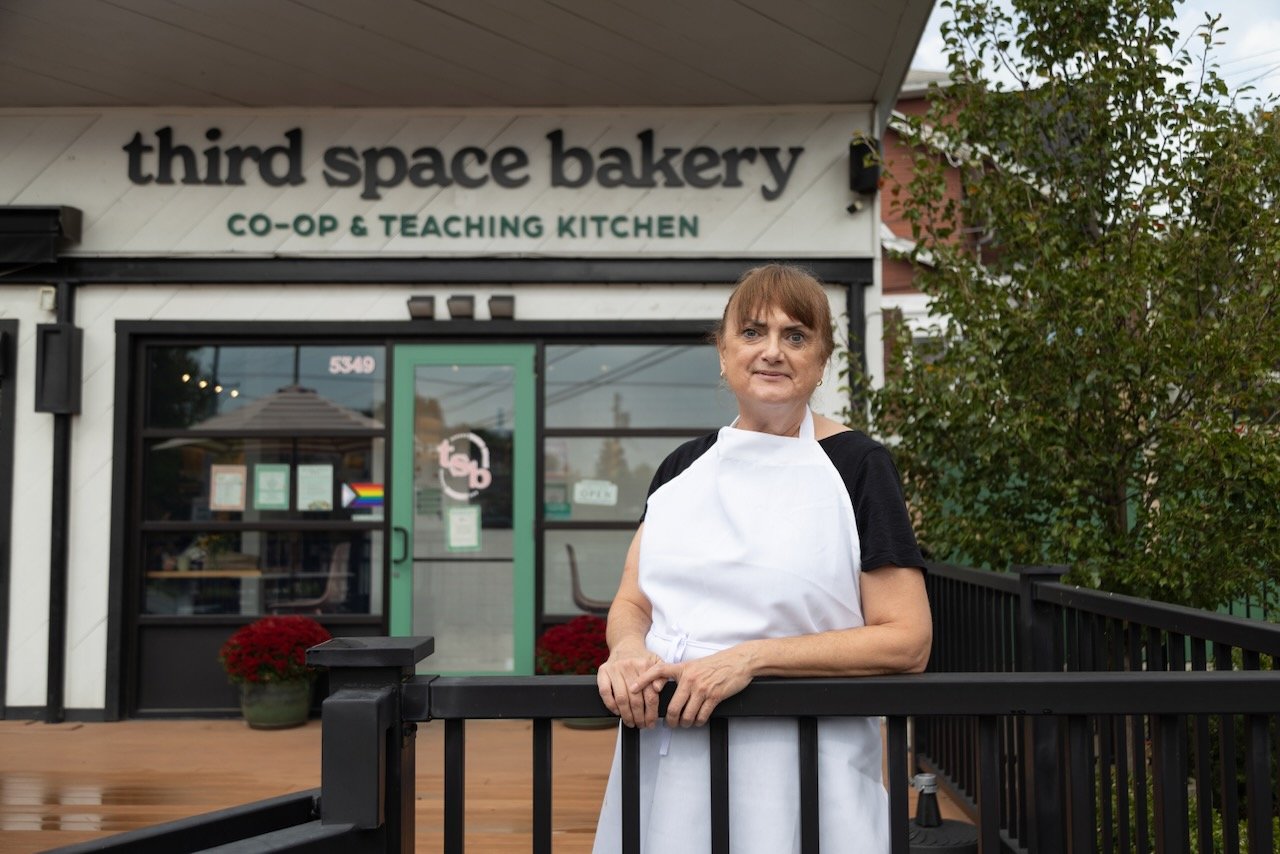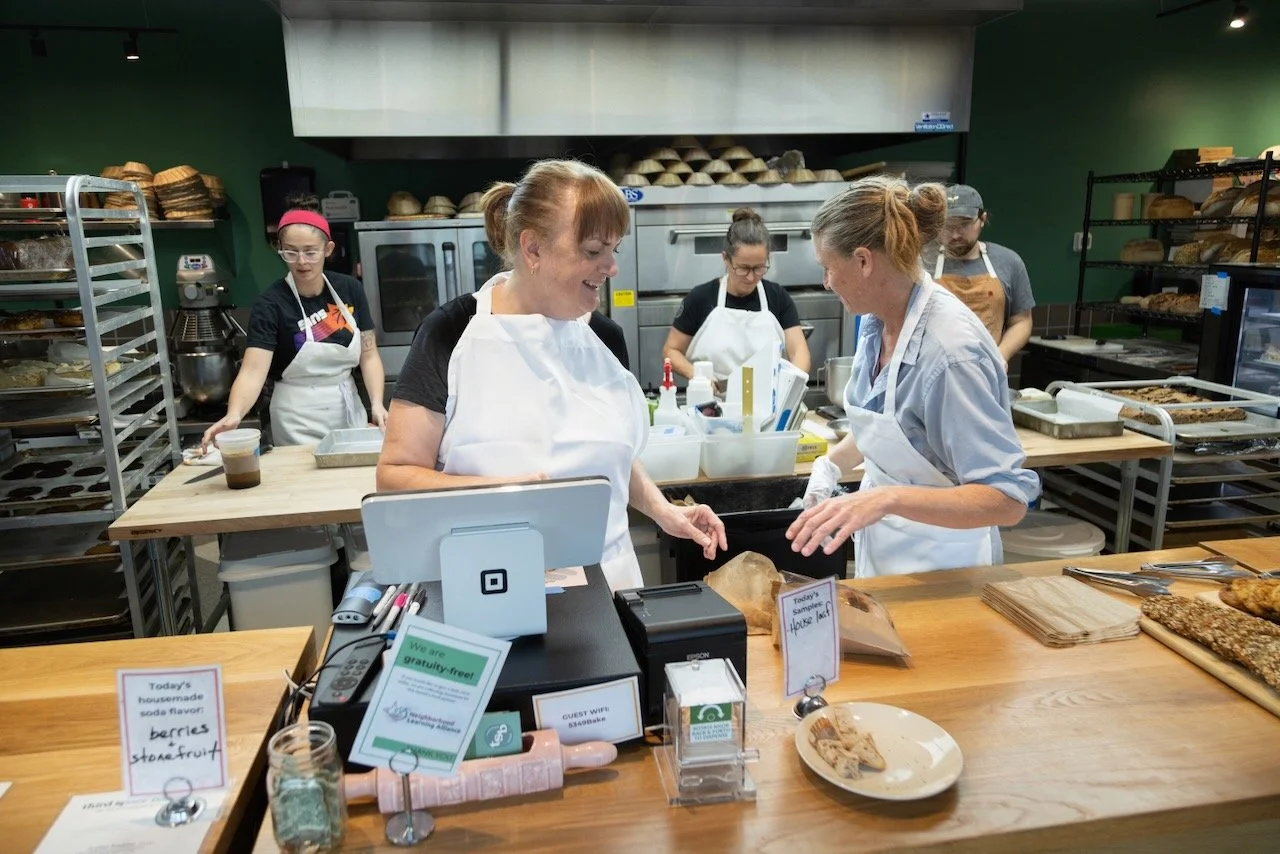A Second Act in a Third Space
Co-founding a bakery isn’t exactly a piece of cake, but Beth Kurtz Taylor, MAFS ’15, found sweetness in her community. (Rebecca Droke)
Asking Beth Kurtz Taylor, MAFS ’15, which Third Space Bakery offering she enjoys most is a bit of an impossible question. During our interview in September 2024, Kurtz Taylor laughed at the idea, her chuckle as rich and indulgent as the treats that Third Space carries.
“There are different categories! My favorite bread is our kamut loaf with kamut flour. All our flours come from Frankferd Farms up in Saxonburg. The everything bagel and house loaf is good. My favorite cake slice is the toasted almond cake, it’s fabulous—it’s a vanilla chiffon cake with an almond pastry cream, our vanilla butter cream, then the toasted almonds, the baker does an amaretto soak on the cake, it’s... yeah.”
Yeah. Not for the first time during this interview, my mouth watered. Kurtz Taylor, who co-founded Third Space Bakery Co-op and Teaching Kitchen in 2024 with Erika Bruce and Chloe Newman, has a natural gift for conveying what’s so great about food—not just the way it tastes, but how it makes us feel. But before she was a teaching kitchen instructor, food tour guide, and freelance food writer, Kurtz Taylor was in the child development field, working with sick and grieving children at UPMC Children’s Hospital of Pittsburgh and elsewhere. When her husband was diagnosed with, and eventually passed away from, chronic liver disease, it caused a shift in perspective and purpose.
“What I had been through with my husband having a chronic disease, and a transplant, and being sick for the last eight years of his life, and then going to raise a grieving child while grieving myself... I had a hard time thinking of going back to that work.”
So Kurtz Taylor worked part-time while she raised her son, but in the back of her mind, she wondered what she could do now. “I said to myself, ‘What do I like? What gives me joy? I can’t do that work anymore,’ and I thought, ‘I like going to the Strip District and buying food and seeing the people I love down there who own businesses, and bringing that home and cooking for my family. I love the vibe of these small family-owned businesses and their history.”
Kurtz Taylor handles baked goods behind the counter of Third Space Bakery. (Rebecca Droke)
She briefly contemplated culinary school, but thought the challenge (and the subsequent standing all day in a restaurant) might be too much. Around that time, she saw an advertisement for Chatham’s Master of Arts in Food Studies program in a copy of Table Magazine.
“I learned more, I went to some info sessions, I applied and was accepted. I was fortunate to go part time, so it took me almost three and a half years to finish, but it was a nice fit for me, because I loved the academic look at food. I knew I liked to cook, I knew I liked good ingredients... but a lot of gut feelings I had about food and the food system were then articulated by what I was learning that led to these ‘ah-ha!’ lightbulb moments: What is organic food and why should we be buying it? Let’s define it and look at it more closely. What is food insecurity and access? A lot of these things I’d worked on the periphery of, but doing the in-depth dive with the class work was phenomenal.”
The network Kurtz Taylor developed at Chatham kept delivering, even after graduating. While working in food writing, food tours, and children’s food education, Kurtz Taylor also participated in what she called “an online foodie group” spearheaded by Chatham Senior Lecturer Sherrie Flick. At a cookbook club off-shoot of that group, Kurtz Taylor met fellow co-founder Erika Bruce, who has served a stint as maker in residence at Chatham’s Center for Regional Agriculture, Food, and Transformation (CRAFT). Kurtz Taylor and Bruce became fast friends, even co-directing a one-week culinary summer camp for teens called Camp Delicious together in 2021 and 2022.
More about CRAFT:
The Center for Regional Agriculture, Food, and Transformation at Chatham University (CRAFT) works to transform the future of food and agriculture in Western Pennsylvania and beyond. They cultivate a more equitable, sustainable, and inclusive food system by providing practical support, research-based tools, and learning opportunities to farmers, food business owners, and food system visionaries.
In the past year, CRAFT has:
Hired two new full-time staff members and eight student employees.
Taught two cohorts of the Market Readiness Course aimed at supporting businesses in developing value-added products.
Been an active partner in launching the Appalachia Regional Food Business Center.
Developed three new, free online courses for business owners.
Continued to update our Regional Food Systems Inventory.
You can read more about CRAFT and their work at craft.chatham.edu
When Bruce told Kurtz Taylor she was contemplating opening a brick-and-mortar bakery space with Chloe Newman (another CRAFT Maker in Residence alum), Kurtz Taylor said, “That’s great! Could I come in on it?’ I’m not a baker, but I see myself as a food educator— I had coordinated a teaching kitchen for three years, I had worked for Common Threads... I thought, could we use this space at night to have cooking classes? So long story short, they let me come in on the whole process.”
Kurtz Taylor is quick to sing the praises of her co-founders and the backgrounds they bring to the table. Chloe Newman built her former business, Crustworthy, from the ground up, and Kurtz Taylor marvels at her creativity with bread and other treats. Erika Bruce, in addition to working for renowned bakeries and restuarants across the country, also works under Christopher Kimball of Milk Street as recipe developer, writer, and on-air personality.
“We would not have the quality of bread and cake and pastry we do without the two of them,” said Kurtz Taylor, “and it’s amazing.”
This celebratory, community-focused, it-takes-a-village attitude is reflected in so much of what Third Space Bakery does, starting at an internal level. Third Space is not just a typical bakery; it’s a cooperative, meaning that workers who have been with Third Space for more than six months have the option to buy into the cooperative themselves, giving them a vote into how the business is run.
“A third space is a place within a community where people in that community gather...it’s where they socialize and find community outside of their home...”
The journey to becoming a co-op was not easy. According to Kurtz Taylor, “Historically you hear of a food co-op, or cooperatives in the farming industry like a milk co-op in the rural world, but a worker-owned cooperative in this area, in this state, is relatively unheard of. So we had to jump through some hoops just to incorporate and get some support even from outside the state to make that happen.
“We just really felt that our workers—” Kurtz Taylor mindfully rephrased here, “our owners needed to be present and part of the decision making, the day-to-day running of the business.”
With the co-op groundwork laid, the trio set out to tackle their biggest challenge yet: what to call their bakery. They bounced around serious ideas, whimsical ones, puns— “What about ‘Community Kneads,’ with a K?” — and generated an entire Google doc with potential names. But eventually, the name came from a simple online quiz.
“We’d have weekly meetings in my dining room at that point, and we answered all these questions, and as we came down through the quiz I said ‘Oh, well, it sounds like a third space.’”
Sociologist Ray Oldenberg’s concept of “third spaces” within communities has received a trendy uptick in interest thanks to post-pandemic TikTok discourse, but Beth Kurtz Taylor first learned of it at Chatham, in a class with Food Studies Director Alice Julier. In Kurtz Taylor’s words, “A third space is a place within a community where people in that community gather... it’s where they socialize and find community outside of their home, which is the first space, the job being the second, and the place, business, bar, church, bakery, wherever it is you find community is your third. It just always resonated with me, all the way through. I immediately connected it with the Strip District and what I felt at some of my favorite businesses down there. And that was something in the back of my mind that I wanted to be a part of.”
(Rebecca Droke)
After explaining the concept to the rest of the team, Third Space finally found its name. “Had I not gone to grad school,” said Kurtz Taylor, “I wouldn’t have had a concept of it. It’s something that drives us all the time. How do we bring people in here? How do we make everyone welcome here?”
That spirit is suffused in Third Space’s myriad offerings, from their products— both sweet and savory choices with vegan and vegetarian options — to their programming— from cookbook clubs to private workshops to classes on sourdough 101. They’ve made concerted efforts to embed themselves in their neighborhood of Garfield, embracing Garfield’s First Friday art gallery crawl and making alliances with local community gardens like Kincaid Street Garden and Garfield Community Farm.
Kurtz Taylor hopes to continue expanding what Third Space can do for Garfield and Pittsburgh with the help of grant funding, which could allow her to follow some “pipe dreams” like providing more educational opportunities for local families and hiring multicultural food practitioners as instructors in Third Space’s classes.
“It’s about finding that money, and other people to cook, and for me to step back as more of a coordinator and less as an instructor,” said Kurtz Taylor. “It all takes time; you have to build the audience first and find the money... and wonder when I sleep. I didn’t want to be on my feet! Sometimes I think ‘oh man, could I be retiring now, instead of doing this?’” She recalled a family member asking her if the time, effort, and investment was worth it. “I said ‘Well, I’m pushing sixty; knock on wood, I’m still in good health, we signed a lease on this building, and even in seven years if I retire and walk away from it, what else would I have been doing all that time?”
Kurtz Taylor is spending her time uniting a neighborhood around the shared pleasure of food. “It’s about reaching out and figuring out how to connect with the community, bring them in here, or go into their spaces, and make [Third Space] a place where...” here, she laughed again, that delicious laugh of someone who knows something good when she tastes it, “where everyone knows your name!”
This article by Sarah Hamm was originally published in the Winter 2025 issue of the Chatham Recorder alumni magazine. To view more Recorder stories, click here.
Sarah C. Hamm is the marketing director at Chatham, overseeing the chatham.edu website, as well as University social media, digital communications, video, and design. An alumna of Chatham’s MFA creative writing program, her creative work has been published in The Fourth River, Coal Hill Review, and IDK Magazine.



